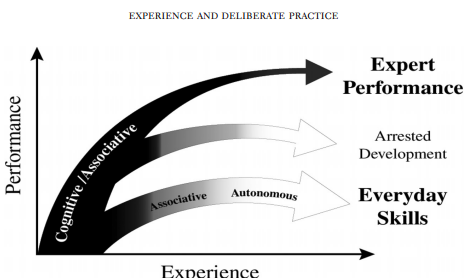Macnamara et al (2014) meta-analysis on deliberate practice not convincing
Recently, Macnamara et al. (2014) published a meta-analysis that, they claimed, showed that "deliberate practice is important, but not as important as has been argued" by Ericsson et al. (1993). Previously, I have written about earlier critical publications about Ericsson's work. Then, I thought these publications, in several ways, did not do justice to his work (read this). One of the authors of this new meta-analysis (Hambrick) was one of the authors whose publication I was critical of then. Now, I was curious whether this new publication would do justice to Ericsson and to the deliberate practice concept. Unfortunately, I don't think it does.
Here is the abstract of the Macnamara paper:
I am often a bit surprised by how these types of publications (the ones saying "deliberate practice is not so important after all") are generally received by people I meet; both laypeople and professionals. They often seem to be somehow relieved by them, saying things like: "Aha! There it is! Practice can only take you so far! Excellence is mainly a matter of talent!" It seems as if they somehow have a desire to believe in a limited role for deliberate practice and, at the same time, quite a sizable role for talent. If that's so, that's dangerous. Wanting to believe something is true does not make it true.
Here is the abstract of the Macnamara paper:
"More than 20 years ago, researchers proposed that individual differences in performance in such domains as music, sports, and games largely reflect individual differences in amount of deliberate practice, which was defined as engagement in structured activities created specifically to improve performance in a domain. This view is a frequent topic of popular-science writing—but is it supported by empirical evidence? To answer this question, we conducted a meta-analysis covering all major domains in which deliberate practice has been investigated. We found that deliberate practice explained 26% of the variance in performance for games, 21% for music, 18% for sports, 4% for education, and less than 1% for professions. We conclude that deliberate practice is important, but not as important as has been argued."I don't find Macnamara et al.'s conclusions convincing. I think they do not do justice to Ericsson et al.'s research and conclusions, and neither to the relevance of deliberate practice. On Ericsson's homepage is a careful reply to the meta-analysis and also a Word file containing Supplemental Online Materials. As we can read in the reply, in many of the studies included in the meta-analysis deliberate practice was either not mentioned at all or defined and measured differently from the way Ericsson et al. (1993) have defined and measured it. In other words, it is dubious whether these studies say anything about Ericsson et al.'s claims. Further, we can read: "The remaining studies do not support Macnemara et al.’s (2014, p. 1615) rejection of Ericsson and Moxley’s (2012, p. 145, italics added) statement that “the concept of deliberate practice can account for the large individual differences between experts and novices”.
I am often a bit surprised by how these types of publications (the ones saying "deliberate practice is not so important after all") are generally received by people I meet; both laypeople and professionals. They often seem to be somehow relieved by them, saying things like: "Aha! There it is! Practice can only take you so far! Excellence is mainly a matter of talent!" It seems as if they somehow have a desire to believe in a limited role for deliberate practice and, at the same time, quite a sizable role for talent. If that's so, that's dangerous. Wanting to believe something is true does not make it true.

Comments